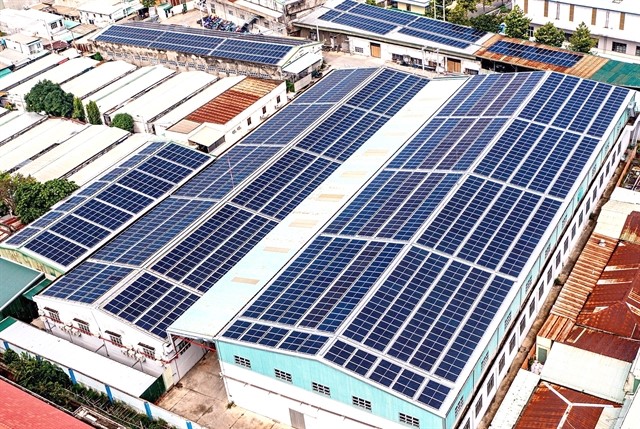Further delay in the issuance of the direct power purchase agreement will affect the foreign investment attraction of Việt Nam.

The direct power purchase agreement (DPPA) mechanism is expected to be issued early to create a breakthrough in the development of power generation sources as well as achieving the goal of promoting sustainable development and attracting foreign investment.
At a conference held by the Ministry of Industry and Trade to raise opinions around the draft decrees on DPPA and mechanisms to encourage the development of rooftop solar power at residential houses, offices and industrial parks, Director of the Electricity Regulatory Authority of Việt Nam Trần Việt Hoà said that numerous investors, international organisations and electricity customers have shown interest in DPPA and expected the early issuance of the mechanism.
He cited a survey of 95 out of 106 renewable energy projects with an installed capacity from 30MW in the adjusted list of the National Power Development Plan (PPD8), showing that 24 projects with a total capacity of 1,773 MW wanted to participate in the mechanism, 11 projects with a total capacity of 2,836 MW were considering and 26 said that they did not want to participate.
On the purchasing side, the survey was carried out with 41 customers. Among them, 20 said that they want to participate in DPPA with a total demand estimated at 996MW.
The figures showed that both the supply and demand of electricity are there for the implementation of DPPA mechanism.
According to Kim Yong Sup, deputy director of Samsung Việt Nam, it is necessary to have clear and detailed instructions for the implementation of DPPA.
He added that reasonable pricing is also important to ensure fair competition among generators as well as rights of customers.
Virginia Foote, Board Member of Việt Nam Business Forum (VBF), said that many member companies of VBF, industrial parks and manufacturing plants have demand to access renewable and clean energy sources. Thus, the mechanism for DPPA should be issued early to facilitate the operation of enterprises, which will help promote foreign investment influx into Việt Nam.
“The issuance of DPPA is critical to many businesses. There should be no further delay,” Bùi Thị Việt Lâm, a representative of the US - ASEAN Business Council in Việt Nam, said.
She stressed that if delay continues, it will affect the foreign investment attraction of Việt Nam. Early issuance will help secure foreign investors, especially those with new investment plans.
The DPPA mechanism will also promote the development of renewable energy and mobilise private investment into this sector, she said.
According to Aguin Toru, chief representative of Japan Bank for International Cooperation (JBIC) in Việt Nam, Việt Nam needs to develop a roadmap for the implementation of the DPPA mechanism so that enterprises can be well-prepared. First, the focus should be on solar and wind power, then biomass power later.
Minister of Industry and Trade Nguyễn Hồng Diên said that the DPPA mechanism and the policy of self-produced self-consumed rooftop solar power are consistent with each other.
Diên said that in the current context, the policy of buying electricity generated by rooftop solar power systems at zero đồng is appropriate.
Appropriate?
In the latest draft, the Ministry of Industry and Trade proposed that electricity generated by rooftop solar power systems should not be sold but only used for self-consumption. If connected to the national grid, the price will be zero đồng.
The reason for not encouraging selling excess solar power to the grid is that it can affect system safety and security, the ministry said.
However, experts said that zero đồng policy will not encourage residents and enterprises to invest in installing rooftop solar power systems.
Energy expert Lã Hồng Kỳ said that it is necessary to develop policies for Vietnam Electricity to purchase the excess power to encourage investments in rooftop solar power.
Experts also proposed mechanisms to sell electricity to “neighbours”.
Energy expert Ngô Đức Lâm said that in many countries, selling electricity to “neighbours” is simple and carried out through separate grids. In Việt Nam, it can be carried via the EVN’s grid and EVN can collect a grid management fee.
The lack of a DPPA makes enterprises hesitant to invest in installing solar power system over worries about the ability to recover capital when they are not allowed to sell the excess, Nguyễn Quốc Việt, Deputy Director of Việt Nam Institute for Economics and Policy Research, said.
Meanwhile, numerous manufacturers want to use renewable energy to achieve green credit for export.
Thus, it is necessary to consider the foundation of a market for direct purchase.
Rooftop solar power also helps reduce costs, he said, citing a survey carried out in an industrial part in Hải Phòng that three solar power projects with a total capacity of 3MW creates around 5,800MHw in 2023 which help enterprises save around VNĐ10 billion.
There are more than 103,000 rooftop solar power projects across the country with a total capacity of more than 9,500MW. — VNS





